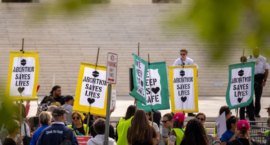
The narrowing of options for physicians in Idaho leaves them in a bind: Do you perform an abortion that could save a woman’s life or her organs, as dictated by EMTALA, or will you face penalties under Idaho law?
Oral arguments can sometimes reveal how the justices of the Supreme Court are approaching the issue at hand. The questions asked by the justices suggest three things: a lack of clarity under Idaho law; abortion as the standard of care; and acknowledgement of fetal personhood.







